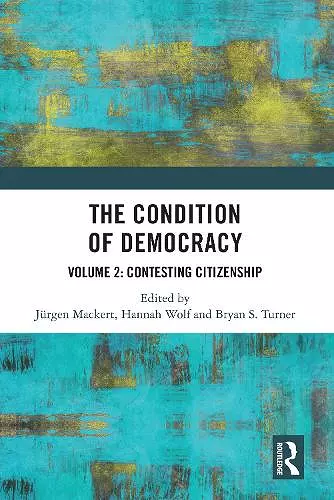The Condition of Democracy
Volume 2: Contesting Citizenship
Bryan S Turner editor Jürgen Mackert editor Hannah Wolf editor
Format:Paperback
Publisher:Taylor & Francis Ltd
Published:9th Jan '23
Currently unavailable, and unfortunately no date known when it will be back
This paperback is available in another edition too:
- Hardback£135.00(9780367745363)

Democracy and citizenship are conceptually and empirically contested. Against the backdrop of recent and current profound transformations in and of democratic societies, this volume presents and discusses acute contestations, within and beyond national borders and boundaries. Democracy’s crucial relationships, between state and citizenry as well as amongst citizens, are rearranged and re-ordered in various spheres and arenas, impacting on core democratic principles such as accountability, legitimacy, participation and trust. This volume addresses these refigurations by bringing together empirical analyses and conceptual considerations regarding the access to and exclusion from citizenship rights in the face of migration regulation and institutional transformation, and the role of violence in maintaining or undermining social order. With its critical reflection on the consequences and repercussions of such processes for citizens’ everyday lives and for the meaning of citizenship altogether, this book transgresses disciplinary boundaries and puts into dialogue the perspectives of political theory and sociology.
"The editors, all members of the Centre for Citizenship, Social Pluralism and Religious Diversity at Potsdam University, have once again put together a wide ranging and informative anthology on the crises of democracy. This volume is a must read for scholars seeking an overview of the challenges that European states face viewed from a comparative perspective."
Mabel Berezin, Professor of Sociology, Cornell University
"This volume sets up a consideration for democratization today in the guise of 'Dahrendorf’s Paradox': if, say, our aim as citizens of the same polity is to end violence, and to do so only through democratic techniques (e.g. liberal, representative, deliberative, or still thousands more), exactly which techniques would we choose? The answer to just that question is anything but non-conflictual as your choice of democratic technique could in itself be anathema to mine or half-way to 'true democracy' as concerns the views of other citizens in our metaphorical polity. So policy proposals to end violence, though all democratic in how they are conceived by us, will at the same time be non or less-democratic. A paradox indeed. Thankfully, this volume does not leave us hanging by the wrists in this realm of tension but rather asks us to orient this perplexing energy at the end of violence, or mitigating xenophobia, or re-articulating citizenship. Bravo to the editors and contributors for this insightful and extremely useful collection."
Jean-Paul Gagnon, Associate Professor of Politics, University of Canberra
ISBN: 9780367745370
Dimensions: unknown
Weight: 285g
190 pages